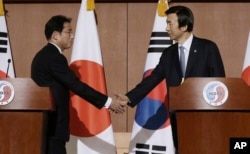Japan and South Korea have reached a landmark agreement that both countries' foreign ministers say resolves the longstanding dispute over Tokyo’s responsibility to "comfort women" who were forced to work as prostitutes in Japanese military brothels in World War II.
In Seoul Monday, Japanese Foreign Minister Fumio Kishida and his South Korean counterpart Yun Byung-se announced they reached a settlement that includes both financial restitution and an official apology from Japan.
"The comfort women issue is an issue whereby many women under the then-military's involvement bore deep scars to their honor and dignity, and from this perspective, the Japanese government acutely feels responsible," said Japanese Foreign Minister Kishida at a joint news conference.
South Korea’s President Park Geun-hye has repeatedly called on Japan’s Prime Minister Shinzo Abe to make a "sincere apology" and offer reparations to the 46 remaining Korean "comfort women," who are now in their 80s and 90s.
It is estimated that 200,000 women throughout the Pacific region were forced into sex slavery by the Japanese military during Japan's colonization of Asia and in World War II.
Abe had issued statements of regret in the past regarding the suffering experienced by the "comfort women" but stopped short of apologizing. Tokyo's position on compensation had been that its obligations were legally settled by a 1965 diplomatic treaty normalizing relations between Japan and South Korea.
A statement released by both countries during the news conference included a message on behalf of Abe.
"As Prime Minister of Japan, Prime Minister Abe expresses anew his most sincere apologies and remorse to all the women who underwent immeasurable and painful experiences and suffered incurable physical and psychological wounds as comfort women," read the statement.
The exact wording of Japan's remarks on the comfort women issue has long been a source of contention. South Korea has insisted that the Japanese government has not fully acknowledged that it was complicit in recruiting women. The foreign ministers did not elaborate on details of the apology. However, there are reports that Abe would send each surviving comfort woman victim a letter of apology.
Kishida said Park and Abe will speak by phone about the deal later Monday.
The Japanese foreign minister also confirmed that Tokyo agreed to pay 1 billion yen (over $8 million) to support the comfort women. The money will go into a South Korean fund similar to a 1997-2007 Japanese initiative called the Asian Women's Fund, set up in to offer assistance to "comfort women." Kishida said the funding was not compensation but rather a donation.
The compromise on language calling the fund a donation versus compensation limits Japan’s legal responsibility and likely gives Abe some political cover from his conservative supporters, who either downplay claims of Japan's wartime atrocities or oppose reopening an issue they claim was settled long ago.
In exchange, Seoul agrees to consider the issue permanently settled, both legally and politically.
"Based on the premise that the Japanese government fully carries out these measures, the South Korean government confirms that this issue will be fully and irreversibly resolved," said Yun, the foreign minister.
Both countries are expected to sign a formal agreement that relieves Japan of any further responsibility and liability for all past wartime grievances.
Japan also wants South Korea to agree to remove the statue of a young "comfort woman" that currently sits in front of the Japanese embassy in Seoul. Every week, "comfort women" supporters hold rallies at this site.
The South Korean foreign minister said his government will discuss this request with the private organizations that put up the statue and organizes the rallies.
"The South Korean government recognizes the Japanese government’s concern that the statue of the girl in front of the Japanese Embassy is in a dangerous, unsafe location," he said.
In November, Park and Abe held their first bilateral meeting to directly address their historical differences. At that time, they both promised to reach a settlement by the end of this year, which marks the 50th anniversary of the establishment of bilateral diplomatic relations.
The United States has also reportedly pressed its key Asian allies, Japan and South Korea, to settle this contentious issue to better deal with an increasingly assertive China and nuclear-armed North Korea.
Youmi Kim in Seoul contributed to this report.






